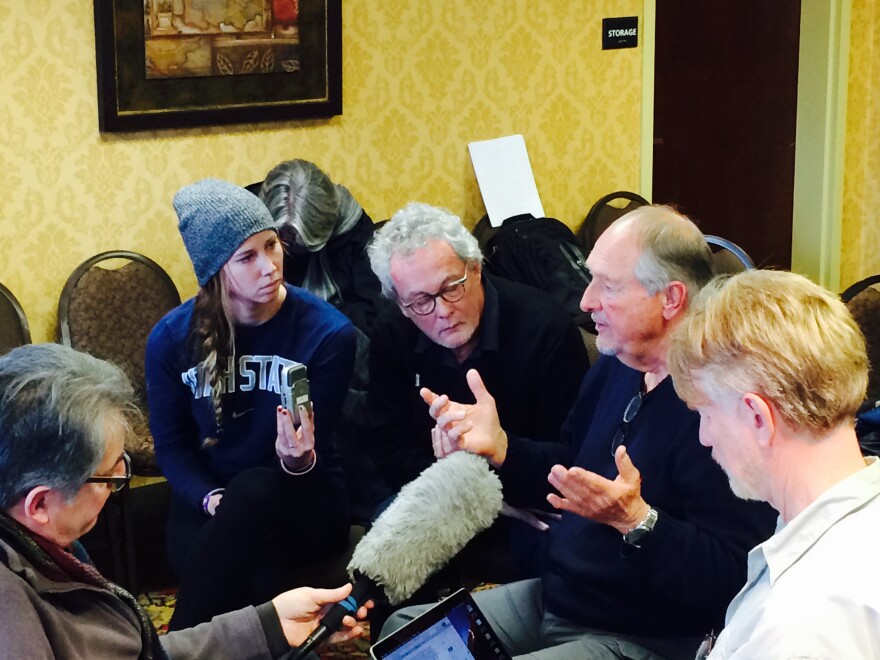Our last installment of the 52 Strong USU Civil Rights pilgrimage series takes us on the road with iconic civil rights activist Bob Zellner. USU professor Jason Gilmore tells us more about the white man who stood up for the rights of blacks, understanding that it was truly for the rights of all.
Although the civil rights movement of the 1950s and 60s was dedicated to improving the plight of African-Americans in this country, there were many white leaders in the movement who dedicated themselves to the cause. Many would challenge them saying it was not their movement to work for. According to these leaders, however, the movement was not just for African-Americans, but for all Americans. Bob Zellner was one such leader.
Zellner is perhaps the most unlikely of civil rights foot soldiers. As a native white Alabamian and a son and grandson of Ku Klux Klan members, Zellner risked literally everything he had when he decided to join the civil rights movement. He would tell you now, some 50 plus years later, that he has never regretted it a day in his life. As a young college student Zellner decided to join SNCC, the Student Nonviolent Coordinating Committee, an organization now famous for its sit-ins, freedom rides and its dedication to pushing the envelope on voting rights throughout the south and eventually the federal level. Zellner went on to become the first white field secretary of SNCC, and worked in both Alabama and Mississippi. Including a stint in Macon, Mississippi, where he was severely beaten for participating in a civil rights march with students.
Zellner has since dedicated the entirety of his life to work on achieving equal rights for all Americans. Even now in his seventies, Zellner remains active and is always happy to impart his wisdom on the next generation of civil rights foot soldiers. Utah State University students Adrian Bustamante and Miranda Vance caught up with Zellner to find out more about his experiences in youth activism, and the challenges of being a white leader in the struggle for the civil rights of African-Americans.
"Well I originally became involved the same way that young people today are getting involved. As a student I found that I was not free to do research on civil rights, even though I was in a class on race relations. Several of us went to meet with Dr. King, and as a result of that, we were asked to leave school. We were threatened with arrests by the police. So I found out very early that segregation didn't just apply to black people, my own freedoms were being curtailed, my First Amendment freedoms which I knew I had a right to. Young people of my generation were inspired first of all by the young black men and women who started the lunch counter sit-ins. But there was a whole struggle in this country to end racial segregation and to really achieve equality. We knew what was right, and the right thing to do, and we felt like we were in a tiny minority if we were willing to do something about it. It was Mrs. Parks who said you can’t study this thing forever as students, you have to take action. That’s why I got involved. So, you have to decide what you’re willing to take a risk for. Usually if the shoe starts pinching hard enough you’re going to do something about it, so I think it’s up to young people to decide what they are willing to take a risk for. Now my inspiration was from the freedom riders who came to my town of Montgomery, Ala. When they were so brutally attacked in Montgomery, we visited them in the hospital and said, ‘Your freedom ride is over.’ And those freedom riders who were bruised, battered and broken said, ‘Oh no, as soon as we can, we’ll get back on the bus.’ We said, ‘If they treat you like this in Alabama, when you get to Mississippi they're going to kill you.’ They said, ‘We know, we’ve written our wills.’ So that was our example, people who were willing to die for something that was that important. So what I ask young people today, ‘What are you willing to take a risk for? Is there anything that you’re willing to die for?’ Whatever that is that is going to be your passion.”
Even though our story series has come to an end, you can get a recap of the USU Civil Rights pilgrimage on their Facebook page, or on Instagram @usucivilrights.


